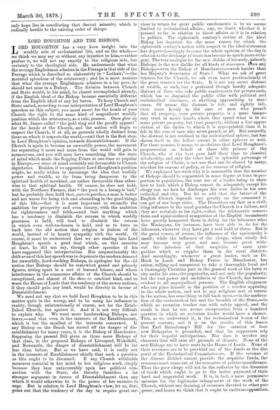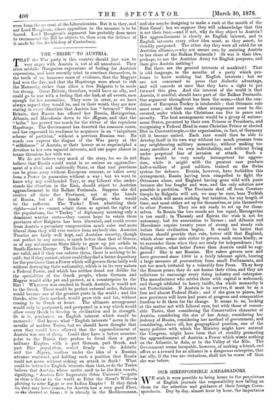LORD HOUGHTON AND THE BISHOPS. L ORD HOUGHTON has a very
keen insight into the worldly side of ecclesiastical life, and on the whole,— we think we may say so without any injustice to him,—rather prefers it, we will not say exactly to the religious side, but certainly to the theological side. He understands that what the average Englishman admires in the Peerage is that side of the Peerage which is described so elaborately in " Lothair,"—the material splendour of the aristocracy ; and he is most anxious that what the average Englishman admires in a lay peer, he should not miss in a Bishop. The division between Church and State would, in his mind, be almost accomplished already, if the English ideal of the Bishop became essentially different from the English ideal of any lay baron. To keep Church and State united, according to our interpretation of Lord Houghton's speeches on this subject, you must assert for the heads of your Church the right to the same kind. of magnificent worldly position which the aristocracy, as a rule, possess. Once give up what St. James called " the gold ring and the goodly apparel " for the heads of the Church, and the nation will begin to respect the Church, if at all, on grounds wholly distinct from those on which it respects the world,—and that is the first step, in Lord Houghton's opinion, towards disestablishment. If the Church is again to become an unworldly power, the movement for separating it more and more from the world will gain in momentum, and you will soon have something like the state of mind which made the Begging Friars at one time so popular in Europe,—a state of mind certainly not favourable to Church dignitaries. Besides, if we appreciate Lord Houghton's position aright, he really wishes to encourage the idea that worldly power and wealth, so far from being dangerous to the spiritual health of mankind, are rather favourable than other- wise to that spiritual health. Of course, he does not hold, with the Northern Farmer, that " the poor in a loomp is bad," - but he probably does hold that, cceteris paribus,aman is better and not worse for being rich and abounding in the good things of this life,—that it is most important to reconcile the ambition for prosperity and even luxury, with the ambition for righteousness and faith,—and that anything which has a tendency to diminish the esteem in which worldly greatness is held, will tend to diminish the esteem in which even well-to-doness is held, and so to force us back into the old notion that religion is jealous of the world, instead of in hearty sympathy with the world. Of course, it must be understood that we are reading into Lord Houghton's speech a good deal which, on this occasion at least, he did not say, though other speeches of his have suggested this interpretation. But unquestionably the drift even of this last speech was to deprecate the modern demand for unworldly, hard-working Bishops, to apologise for the old notion that Bishops should be somewhat grand and princely figures, sitting apart in a sort of learned leisure, and whose interference in the commoner affairs of the Church should be exceptional, and almost of the dens ex machines kind, and to warn the House of Lords that the tendency of the newer notions, if they should gain any head, would be directly in favour of Disestablishment.
We need not say that we hold Lord Houghton to be in this matter quite in the wrong, and to be using his influence in reality, though unintentionally of course, not for the Estab- lished Church, but against it. And it is not very difficult to explain why. We want more hardworking Bishops, not fewer,—and that even in the interests of the Establishment, which is but the smallest of the interests concerned. If any Bishop on the Bench has staved off the danger of dis- establishment for many years, it is the Bishop of Manchester. Supposing the present Bill gives us three more Bishops of that class, in the proposed Bishops of Liverpool, Wakefield, and Newcastle, the danger of disestablishment will be far less than before. But as we have said, it is really not in the interests of Establishment chiefly that such a question as this ought to be discussed. If any Church withholds measures essential in her mind to her religious work, simply because they bear unfavourably upon her political con- nection with the State, she thereby furnishes a far stronger argument in favour of Disestablishment than any which it would otherwise be in the power of her enemies to urge. But in relation to Lord Houghton's view, let us, first, point out that the tendency of the day to require great ser- vices in return for great public emoluments is by no means limited to ecclesiastical affairs ; nay, we doubt whether it is pressed so far in relation to those affairs as it is in relation to politics. The eighteenth century's notion of the ideal Bishop has departed for the same reason for which the eighteenth century's notion with respect to the ideal statesman has departed,—simply because the whole opinion of the day in relation to the discharge of trusts has become so much more strin- gent. The true analogue for the new dislike of leisurely, princely Bishops, is the new dislike for all kinds of sinecures. Does any Bishop,—even the Bishop of Manchester,—work harder than her Majesty's Secretaries of State ? What we ask of great trustees for the Church, we ask even more pertinaciously of the great trustees for the State. It is not any secret distrust of wealth, as such, but a profound though hardly adequate distrust of those who take public emoluments for private ends, which has so disgusted the public alike with political and ecclesiastical sinecures, or anything approaching to sine- cures. Of course this distrust is felt, and rightly felt, even more keenly in the case of men who preach that all property, even private property, is a mere tempo- rary trust in men's hands, where they spend what is in no sense private property, but trust property, without a due appre- ciation of the duties to which it is appropriated, than it is felt in the case of men who never preach at all. But assuredly the distrust is not confined to the ecclesiastical sphere, but has shown itself in the fullest extent in other spheres as well. For these reasons, it seems to us obvious that Lord Houghton's prepossession on behalf of those idle princes of the Church, who at the best gave half their time to classical scholarship, and only the other half to splendid patronage of the religion of Christ, is not one that can be shared by many, whether for reasons of policy, or for reasons of religion. We explained last week why it is reasonable that the number of Bishops should be augmented in some degree at least in pro- portion to population, the true use of a leader being to show how to lead, which a Bishop cannot do adequately except his clergy can see how he discharges his own duties in his own cathedral and city. But let us add that the future of the English Church depends very greatly on the command it can get of our large cities. The Dissenters say that as a civil- ising influence in the rural parishes the Church is a failure, and they are certainly so far right,—that the aristocratic connec- tions and squirearchical sympathies of the English incumbents have greatly hampered them in doing for the labourers what the Wesleyans, for instance, have been able to do for the labourers, wherever they have got a real hold of them. But in the great towns, of course, the influence of the squirearchy is small ; while the influence of the clergy, when wisely led, may become very great, and may become great with- out the infusion of that suspicion of caste sym- pathies which so cripples them in the rural districts. And . accordingly, whenever a great leader, such as Dr. Hook in Leeds and Bishop Fraser in Manchester, has arisen, willing and competent to take a thoroughly loyal and a thoroughly Christian part in the general work of the town or city under his care, the popularity, and not only the popularity, but the vast power and usefulness of the Church, has become evident to all unprejudiced persons. The English clergyman who can place himself in the position of a teacher appealing to the whole nation, and not to any religious sect or coterie in the nation, has something to fall back upon,—in the modera- tion of the ecclesiastical law and the breadth of the State,—to which no sectarian teacher can with safety appeal, and the result is that he can secure co-operation from a hundred quarters in which no sectarian leader would have a chance. This, as we understand it, is the ecclesiastical lesson of the present century, and it is on the results of this lesson that Earl Beauchamp's Bill for the creation of four new Bishoprics is grounded, and that its supporters rely for their hopeful anticipations. Nor does it involve any elements that will raise old grounds of dispute. None of the new Bishops are to have seats in the House of Lords. None of their revenues are to be provided out of the funds at the dis- posal of the Ecclesiastical Commissioners. If the revenue of the diocese divided cannot provide the requisite funds, the revenues must come out of the resources of private munificence. Thus the poor clergy will not be the sufferers by the diversion of funds which ought to go to the better payment of their hard and ungrateful work. It is, in fact, a-mere permissive measure for the legitimate enlargement of the work of the Church, without any draining of revenues devoted to other pur- poses; and hence we think that it ought to excite no opposition, even from the severest of the Liberationists. But it is they, and not Lord Houghton, whose opposition to the measure is to be feared. Lord Houghton's argument has probably done more to recommend the Bill he objects to, than even the defence of it made by the Archbishop of Canterbury.



































 Previous page
Previous page